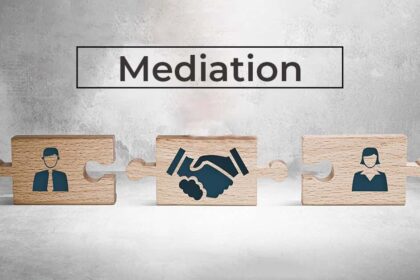
Family disputes can be emotionally charged and complex, making the process of resolving them through litigation a daunting and expensive prospect. This is where mediation steps in as a powerful alternative.
Mediation in family law offers a more collaborative, flexible, and often less adversarial way to address issues like divorce, child custody and spousal support.
In this blog, we’ll take a look at the benefits of mediation and outline the key steps in the mediation process.
The Benefits of Mediation:
Maintaining Control: Mediation allows parties to maintain control over the decisions that affect their lives, rather than leaving these decisions to a judge. This sense of empowerment can lead to more satisfactory outcomes for all parties involved.
Cost-Effectiveness: Litigation can become expensive due to attorney fees, court costs, and lengthy legal proceedings. Whereas Mediation is generally more cost-effective as it requires fewer formal procedures and less time in court.
Preservation Of Relationships: Especially important in family law cases, mediation promotes open communication and cooperation. This helps to preserve relationships between family members, which is particularly vital when children are involved.
Confidentiality: Mediation proceedings are confidential, providing a safe space for parties to discuss sensitive matters without the fear of public exposure that often accompanies courtroom trials.
Customised Solutions: Mediation allows for creative and personalised solutions that cater to the unique needs of every family. This flexibility can help a more satisfying and sustainable agreement to be reached.
Quicker Resolutions: Mediation tends to be quicker than traditional litigation, as it doesn’t involve waiting for court dates and navigating lengthy court processes.
The Mediation Process:
Initial Consultation: The parties meet with a qualified mediator to discuss the issues at hand. The mediator explains the process and helps determine if mediation is suitable for the situation.
Joint Sessions: During joint sessions, all parties meet with the mediator to openly discuss their concerns, goals, and potential solutions. The mediator facilitates productive communication and guides the conversation toward resolution.
Private Sessions: The mediator may hold private sessions with each party to discuss sensitive matters or explore potential compromises. This personalised attention can help the parties to express their needs more openly.
Negotiation and Agreement: Through joint and private sessions, parties work together to reach a mutually agreeable solution. The mediator assists in brainstorming options and finding common ground.
Drafting the Agreement: Once an agreement is reached, the mediator helps put it in writing. It’s important to ensure that the agreement is clear, comprehensive, and most importantly… Legal.
Legal Review: Parties may choose to have their mediation agreement reviewed by their respective legal representatives to ensure it aligns with their legal rights and obligations.
Court Approval: The mediated agreement will need court approval to become legally binding. Once approved, it becomes an enforceable court order.
Conclusion:
Mediation offers families a way to navigate difficult legal issues with less stress, cost, and ill-feeling compared to traditional litigation.
Its emphasis on collaboration, control, and tailored solutions makes it a valuable tool in family law cases.
By understanding the benefits and process of mediation, families can approach their disputes with a sense of hope for positive outcomes and a brighter future ahead.
How Can HAB Law Help?
Court processes can sometimes be lengthy and stressful, so we aim to resolve things outside court wherever we can.
We can provide advice on agreements arrived at via mediation, provide advice and guidance on whether mediation may be suitable for your circumstances, and discuss the various types of mediation that may be available to you including whether you may be able to receive legal aid for mediation, help you weigh up the benefits of mediation over litigation.
If you require advice on mediation – please do not hesitate to get in touch with us.

